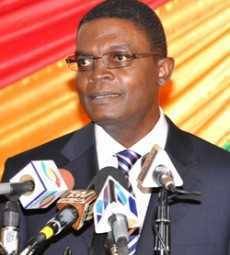The Institute for Democratic Governance (IDEG) has advocated giving the Speaker of Parliament a casting vote to break parliamentary deadlocks.
The proposal was based on the rancor that had characterized Ghana's hung Parliament and the Supreme Court's recent declaration that a Deputy Speaker of Parliament presiding over proceedings in the House had the right to vote on matters for determination, according to the IDEG's Executive Director, Dr. Emmanuel Akwetey.
interest of the country
He told the Daily Graphic that a Speaker was the finest person for the job since the role was comparable to that of the President and necessitated that the holder of the office rise beyond politics to protect the national interest.
"If we bring in the casting vote, it will determine who is chosen as Speaker of Parliament, and each political party would have to take that into account," Dr. Akwetey explained.
"The Speaker of Parliament in the United Kingdom can come from any political party, but once elected, he is no longer a member of that party in Parliament and has a separate standing. So that we can learn from others (countries) and do the right thing by putting in place all of the conditions that will allow a Speaker to represent Parliament as a whole and in the national interest, rather than being seen as being directed by the party chairman or grassroots people on what to do, such a Speaker would not be fit for the job "..
a way out of the stalemate
Because it is possible for a political party to win the presidential election but lose the legislative election, Dr. Akwetey believes Ghana's Parliament, as the master of its own laws, should be prepared to deal with any outcome.
He also called for a review of the present standing orders in order to guarantee that the current hung Parliament runs smoothly for the next two and a half years.
"We need the Speaker to have a casting vote so that work can get done in the remaining years of this Parliament without becoming political or polarizing," he added.
"Parliament must not be a place where people fight or threaten to fight, thus it is past time for Parliament to give the Speaker a casting vote," he continued.
Education
Dr. Akwetey claimed that educating Ghanaians and legislators on the job of the Speaker will help them comprehend how important it is for the Speaker to rise beyond partisanship.
In his opinion, the Speaker of Parliament's job was only second to the President's in the national leadership hierarchy and ought to be regarded as such.
"The nature of the position transforms individuals, especially those with strong, independent minds and ethics, and Speakers throughout our country's history have demonstrated this, even to the point of clashing with their political parties in Parliament."
"This isn't to say they aren't politicians," he continued, "but a Speaker must be aware of the duty he has and the expectations that all Ghanaians have of that post."




No comments yet
Be the first to share your thoughts!